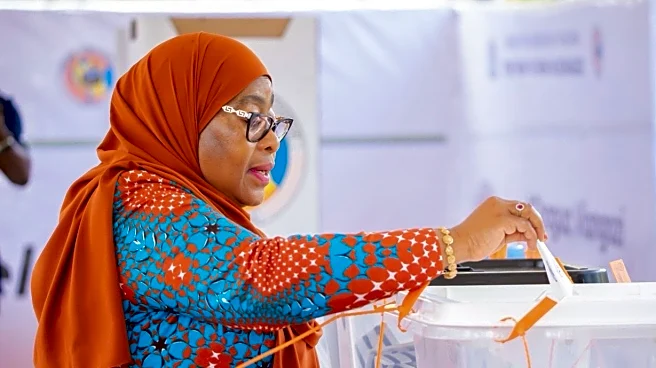DODOMA, Tanzania (AP) — Tanzanian President Samia Suluhu Hassan won the country’s disputed election with more than 97% of the vote, according to official results announced early Saturday, in a rare landslide
victory in the region.
The result is likely to amplify the concerns of critics, opposition groups and others who said the election in Tanzania was not a contest but a coronation after Hassan's two main rivals were barred or prevented from running. She faced 16 candidates from smaller parties.
The Oct. 29 election was marred by violence as demonstrators took to the streets of major cities to protest the vote and stop the counting of votes. The military has been deployed to help police quell riots. Internet connectivity has been on and off in the East African nation.
Tundu Lissu, leader of the Chadema opposition group, has been jailed for months, charged with treason after he called for electoral reforms that he said were a prerequisite for free and fair elections. Another opposition figure, Luhaga Mpina of the ACT-Wazalendo group, was barred from running.
At stake for the ruling Chama Cha Mapinduzi party was its decades-long grip on power amid the rise of charismatic opposition figures who hope to lead the country toward political change.
Still, a landslide victory is unheard of in the region. Only President Paul Kagame, the authoritarian leader of Rwanda, regularly wins by a landslide.
Rights groups including Amnesty International cited a pattern of enforced disappearances, arbitrary arrests and extrajudicial killings in Tanzania ahead of the polls.
In June, a United Nations panel of human rights experts cited more than 200 cases of enforced disappearance since 2019, saying they were “alarmed by reports of a pattern of repression” ahead of elections.
Tanzania’s president oversaw "an unprecedented crackdown on political opponents,” the International Crisis Group said in its most recent analysis. “The government has curbed freedom of expression, ranging from a ban on X and restrictions on the Tanzanian digital platform JamiiForums to silencing critical voices through intimidation or arrest.”
The political maneuvering by Tanzanian authorities is unprecedented even in a country where single-party rule has been the norm since the advent of multi-party politics in 1992.
Government critics point out that previous leaders tolerated opposition while maintaining a firm grip on power, whereas Hassan is accused of leading with an authoritarian style that defies youth-led democracy movements elsewhere in the region.
___
Muhumuza reported from Kampala, Uganda. An Associated Press reporter in Dodoma, Tanzania contributed.










